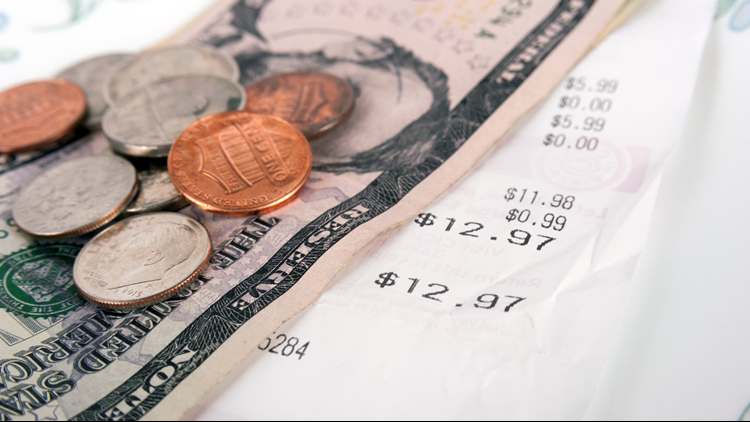ALBANY -- James Valentine works at Dunkin Donuts in Ithaca and has lived with the ups and downs of New York's increasing minimum wage.
On one hand, he gets bigger paychecks when he works enough hours.
On the other hand, hours can be sporadic as New York annually increases its minimum wage toward $15 an hour in the New York City area and $12.50 upstate.
"When I get plenty of hours, it's good. When I don’t, I live,” Valentine said.
James is one of the 2 million New Yorkers earning the minimum wage who got a raise at the end of last year. But as the salaries go up, there are concerns across New York about the impact the higher wages are having on businesses.
Some restaurants, for example, said they have cut staff or eliminated positions, such as busboys.
Others are moving more toward automation and hiring fewer workers, said Kevin Dugan, the government affairs director for the state Restaurant Association.
Dugan pointed to the recent closure of all Papa John's franchises in Rochester as an example.
“They cited increased economic pressure from the state of New York as one of the reasons why," Dugan said.
“Unfortunately, we're going to see that continuing to happen, where if not closing all together, then going to those tough decisions that may cost people jobs. That’s unfortunately the reality of the situation in New York.”
Wages on the rise
Since 2016, the state has been increasing the minimum wage.
This past December, the minimum wage rose from $9.70 to $10.40 an hour for places north of Westchester County.
Long Island and Westchester increased from $10 to $11, and large New York City employers increased the wage from $11 an hour to $13 an hour; for small city employers, it is $12 an hour.
The city's minimum wage for large employers will hit $15 an hour by year's end and for small employers the following year.
The $15 wage will go into effect on Long Island and Westchester by the end of 2021.
For the rest of the state, the minimum wage will go to $12.50 an hour by the end of 2020.
"New York proudly set an example for the nation by raising the minimum wage to $15,” Cuomo said in a statement.
"The fight for economic justice for our working families continues, and we won't stop until every New Yorker is paid the fair wages they deserve."
Supporters see progress
The debate over a higher minimum wage has played out nationally as New York joined California in moving toward a $15 an hour minimum wage.
California's $15 minimum wage will take effect in 2022, and some cities have already installed a $15 wage, including for large employers in Seattle.
According to a 2016 study from the Economic Policy Institute, a labor-backed group, once the $15 minimum wage has been phased in, workers on average will be making around $4,800 more each year.
But that's if they keep the same number of hours.
“Raising the minimum wage raises standards for all workers,” said Stuart Appelbaum, president of the Retail, Wholesale and Department Store Union, in a statement.
When Seattle's minimum wages were raised, it did not lead to more people becoming unemployed, according to a Center on Wage and Employment Dynamics, which is located at the University of California at Berkley.
Advocates of higher wages said they haven't seen employment losses in New York either since the minimum wage started to increase.
“It's been phasing in for more than a year,” said Paul Sonn, the state policy director at the National Employment Law Project, a progressive group in Washington D.C.
“There’s no evidence that this raise in pay has hurt the economy either upstate or down."
Concerns from companies
But ask some small business owners and they see the opposite.
“It’s just the economic bottom line of it; we have to survive first," said Patrick Pipino, owner of a Ben and Jerry’s in Saratoga.
“I’ve done the analysis that shows that we’re OK up until $12 an hour, which is where we are at right now. That’s what keeps me up at night.”
Another concern for New York restaurants is the possible elimination of the tip credit.
If eliminated, restaurants would also have to pay higher hourly wages for previously tipped employees.
They are currently paid between $7.50 an hour for most of the state and $8 an hour in New York City.
In 2015, the tipped wage in New York increased from $5.50 to $7.50 an hour outside of the city.
But the state is considering moving them to the current minimum-wage scale and holding hearings on the issue.
“We welcome increased wages that come as part of a growing economy. But putting mandates on employers, while at the same time increasing their tax and regulatory burden, is not the way to go,” said Zack Hutchins, spokesman for the state Business Council.
Wage fight continues
The federal minimum wage has been set at $7.25 an hour since 2009, but more than half of the U.S. have state minimum wages that are higher than that.
In New York, about half of people who are paid $15 or less hourly are 35 or older, according to the state Labor Department.
The $15 wage is what it would be if it had kept up with inflation since 1970, the state said.
So businesses said they are trying to balance the ability to hire young people at the minimum wage with the understanding that older workers may rely on the minimum wage to support a family.
“It hasn’t really affected us yet, we try to stay ahead of the curve,” said John Martorella, manager of Domms Bowling Center in Rochester.
“We’ve got contracts with leagues. We're not like a restaurant where they have to raise their prices astronomically and fight for business. We have raised some prices on beer and stuff like that, but for the most part, we're not really seeing it as of right now.
"But I actually worry for everyone that’s in business.”
Some supporters of the higher wage said the goal is that by paying higher wages, workers will spend more in the community -- helping the economy.
“I’m able to pay more bills on top of me being able to afford more,” said Joshua Canas, who works at Insomnia Cookies in New York City and is a part of the organization Fast Food Justice.
“It raises the standard. To be honest, it puts everyone in a happier work environment knowing that they get paid more.
The University of New Hampshire surveyed a number of economists on the idea of a $15 minimum wage.
They found that most economists oppose a $15 minimum wage, with 83 percent saying it will hurt youth employment.
But some business owners are hopeful that by paying their workers more, their bottom lines will improve through more sales because people have more money in their pockets to spend.
“In the short run, it puts a strain on payroll,” said Jeff Kahn owner of CyberCafe West in Binghamton.
“The last thing I resent paying, and I resent paying a lot of things, is my people that help me and my business.
"So I don’t really have a problem with it. It makes things more difficult, but it’s not something I resent, and eventually the numbers work themselves out. A living wage will help the community.”



